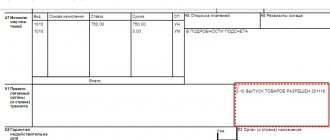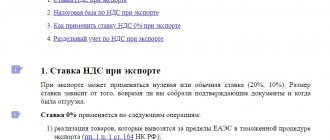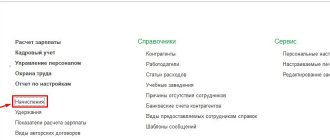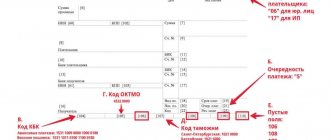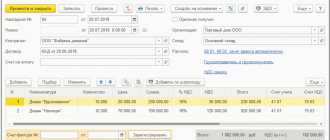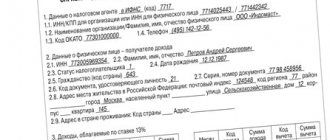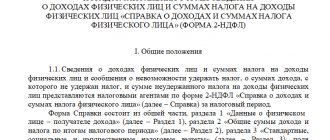When calculating VAT when exporting goods from Russia to countries participating in the Customs Union, you must be guided by Appendix 18 to the Treaty on the Eurasian Economic Union (Clause 1, Article 72 of the Treaty on the Eurasian Economic Union). Its effect extends both to the export of goods from the territories of the countries participating in the Customs Union, and to the export of goods from other countries and released for free circulation in the territory of the Customs Union. This follows from the provisions of paragraph 3 of Annex 18 to the Treaty on the Eurasian Economic Union.
By the way, the Federal Tax Service of Russia places international treaties (other regulations), information materials and sample documents related to the activities of the Customs Union on its official website in the “Customs Union” section (letter of the Federal Tax Service of Russia dated July 9, 2010 No. ShS-37- 3/6330).
If you are late with export confirmation, you will have to pay VAT and penalties
The first time we did not have time to receive an application from the buyer to import goods on the 181st day. As a result, we will submit the documents necessary to confirm the 0% VAT rate when selling our goods to Belarusian counterparties late. We are now drawing up an updated declaration for the shipment period. When we have to pay VAT, what entry should we make in accounting? And do I have to pay penalties?
You must pay VAT (at a rate of 18% or 10%) no later than the 181st day from the date of shipment of the goods (Clause 9 of Article 165 of the Tax Code of the Russian Federation). The entries for calculating VAT in accounting will be as follows.
| Contents of operation | Dt | CT |
| 181st day from the date of shipment of goods for export | ||
| VAT is charged on the cost of goods sold to the Customs Union countries if the zero rate is not confirmed | 19 “VAT on acquired assets”, subaccount “VAT accrued on transactions for which the application of a zero rate has not been confirmed” | 68 “Calculations for taxes and fees”, subaccount “Calculations for VAT” |
| When you have collected all the documents necessary to confirm the export, make a reverse entry. And if you still do not collect a complete package of documents to confirm the export rate, the accrued VAT from account 19 will need to be written off as expenses (debit to subaccount 91-2 “Other expenses”). Keep in mind that in tax accounting it is unlikely to be able to take into account such VAT in expenses without disputes (Resolution of the Presidium of the Supreme Arbitration Court of the Russian Federation dated 04/09/2013 N 15047/12) | ||
| Accepted for deduction of “input” VAT on goods sold for export | 68, subaccount “VAT calculations” | 19 “VAT on purchased assets” |
Payment of VAT is made by standard posting to the debit of account 68, subaccount “VAT Calculations”, and the credit of account 51 “Calculation Accounts”.
The inspectorate may consider that penalties should be paid in your situation and will issue a demand to you. The inspection will probably calculate the penalty based on the fact that the tax on unconfirmed exports had to be paid in the usual manner - 1/3 no later than the 20th day of each of the 3 months following the quarter of shipment (Clause 1 of Article 174 of the Tax Code of the Russian Federation; Letters from the Ministry of Finance Russia dated July 28, 2006 N 03-04-15/140; Federal Tax Service of Russia dated August 22, 2006 N ШТ-6-03/ [email protected] ).
You can argue with the penalties. After all, the Supreme Arbitration Court said back in 2006 that VAT penalties must be paid not from the date of shipment of goods for export, but starting from the 181st day after this date (Resolution of the Presidium of the Supreme Arbitration Court of the Russian Federation dated May 16, 2006 N 15326/05). And after him, federal courts began to take a similar position (Resolutions of the Federal Antimonopoly Service dated July 12, 2011 N A65-20208/2010; FAS VVO dated October 7, 2010 N A43-40137/2009; FAS ZSO dated June 22, 2010 N A67-8303/2009 ; FAS DVO dated January 21, 2009 N F03-6112/2008). These disputes involved the payment of penalties by ordinary exporters. However, the intergovernmental Protocol on Goods provides for the payment of penalties in the manner prescribed by national legislation, that is, it actually makes reference to the Tax Code (Clause 3 of Article 1 of the Protocol on Goods). Therefore, the principles for calculating penalties for unconfirmed exports to Belarus should be the same as for calculating penalties for unconfirmed exports to non-CIS countries.
Problems with export
Another point that I would like to dwell on also concerns exports - the supply of goods to Belarus and Kazakhstan that are exempt from VAT in accordance with the Tax Code of the Russian Federation. The list of such goods is contained in Art. 149 of the Tax Code of the Russian Federation. Anyone who exports knows that when delivering to third countries, that is, outside the Customs Union, for goods listed in Art. 149 of the Tax Code of the Russian Federation, zero VAT rate does not apply. The item is considered an exempt item and no rate of tax is applied to it. What does this mean? No tax is payable on such a supply, but input VAT is not recoverable. Within the CU, on the basis of the Agreement and the Protocol, a different procedure applies. A zero VAT rate is applied to absolutely all goods sold to Belarus and Kazakhstan. This means that the goods listed in Art. 149 of the Tax Code of the Russian Federation, when they are sold in the Republic of Kazakhstan and the Republic of Belarus, they are subject to a zero rate and “input” VAT is subject to reimbursement upon submission of the corresponding package of documents to the tax authority. However, a problem arises if the exporter, within the prescribed period, cannot collect the documents with which he substantiates the zero VAT rate. An interesting situation arises here. Since the Agreement excluded these goods from Art. 149 of the Tax Code of the Russian Federation and they are no longer considered exempt; if the zero rate is not confirmed within the prescribed period, the taxpayer is obliged to tax these supplies at the 18% VAT rate. Why? Article 149 of the Tax Code of the Russian Federation does not apply to these goods, clause 2, which lists goods taxed at a 10% rate, also does not contain these goods, the only option left is to apply an 18% VAT rate to these goods. If documents are subsequently collected confirming the right to apply the zero rate, the tax paid from the taxpayer’s own funds will be refunded. There are also special features in the case when a Russian taxpayer sells his goods to a non-resident of the Customs Union, but exports them from the territory of the Russian Federation to the territory of a member state of the Customs Union. He exports them on the basis that the non-resident who purchased these goods instructs the exporter to ship them directly, for example, to Kazakhstan. There may be two different situations here. The first is when a non-resident enters into a purchase and sale agreement with an economic entity of a member state of the Customs Union. In this case, when importing an exported product, for example, into the Republic of Kazakhstan, the Kazakh importer, in accordance with the Protocol, will be required to fill out an application (one of the main documents on the basis of which our Russian exporter can confirm the zero VAT rate) and transfer it to the Russian exporter, since the goods are imported with territory of the Russian Federation, which is a member of the CU. If there is such a statement, the Russian exporter can confirm the zero tax rate in the prescribed manner. The second option is when a Russian exporter sells his goods to a non-resident and also exports them to the territory of the Republic of Kazakhstan, but the non-resident and the economic entity of the Republic of Kazakhstan have concluded not a sales agreement, but a processing agreement. In this case, based on the norms of the Agreement and the Protocol, the Kazakh importer should not fill out any application, since he does not purchase the goods, this product will not be the property of the Kazakh processor, no tax should be paid when importing this product, and accordingly, there will be no application. Since there will be no statement from the Kazakh side, the Russian exporter will never be able to confirm a zero tax rate for such supplies. And, if he declares these supplies as taxable at a zero rate, he will have to pay the tax from his own funds. Thus, the same export within the framework of the same agreements concluded with a non-resident entails different tax consequences. I would like to advise those who carry out such deliveries - if you enter into an agreement with a non-resident, but the delivery will be carried out within the vehicle without fail. Since you are shipping your goods directly to a business entity of the Customs Union, find out from him what kind of agreement will be concluded between a non-resident and a person of the Customs Union state. If this cannot be done, the tax risks that I mentioned are great.
The deduction is possible without an application for the import of goods
The Kazakh buyer delayed for a long time in submitting to us the application for the import of goods. And then he sent it, but there was no tax service mark on it. We don't know whether he paid his VAT or not. I think that we will not be able to confirm the export VAT rate. What to do? Can we force the buyer to reimburse us for the VAT that we will have to pay to the budget?
The inspection, having not received from you an application for the import of goods with the inspection mark of your buyer, can electronically receive confirmation of the payment of “import” VAT from the Kazakhstan inspection. This possibility is provided for by international agreements (Clause 5 of Article 1 of the Protocol on Goods; Article 6 of the CU Agreement; Protocol on the exchange of information, approved by Order of the Federal Tax Service of Russia dated January 18, 2011 N ММВ-7-2/ [email protected] ).
But your buyer might not have paid the “import” VAT. In this case, you will not be able to confirm the zero VAT rate.
The contract can specify penalties (covering losses in VAT and penalties) if the buyer does not submit an application with the required mark within the agreed period (for example, within 150 - 170 days from the date of shipment). It is also important to decide in which court the dispute will be heard if your buyer does not send you an application on time and also refuses to pay fines. After all, you are unlikely to be satisfied if this is a Kazakh court. Consult with lawyers on how to correctly formulate the terms you need in the contract.
Features when importing
I would also like to dwell on some situations concerning the import of goods. Most often, taxpayers ask a question that concerns the import from the territory of a member state of the Customs Union of goods that do not originate in the territory of the Customs Union . In what case should VAT be paid to the customs authorities on such goods, and in what case should it be paid to the tax authorities? Within the framework of the Agreement and the Protocol on indirect taxes upon import, those goods that are released into free circulation on the territory of Belarus or Kazakhstan and these goods are sold by an economic entity of a CU member state to a Russian importer under a sales contract. In this case, the tax is paid to the tax authority. In other cases, when the goods are not released for free circulation on the territory of the Customs Union, are transported in transit through the territory of Belarus or Kazakhstan and enter the territory of the Russian Federation, in all such cases the tax must be paid to the customs authorities. As for the determination of the tax base when importing goods, it is regulated not by national legislation, but directly by the Protocol on the collection of indirect taxes. According to the Protocol, the tax base is determined on the date the taxpayer accepts imported goods for registration on the basis of their value, which is the transaction price payable to the supplier of goods in accordance with the terms of the agreement or contract. Those who worked under a bilateral Agreement with Belarus remember that when Belarusian goods were imported into the territory of the Russian Federation, the tax base was determined as the cost of the goods based on the contract and it was necessarily increased by the cost of at least transporting goods from the seller to the buyer. In the tripartite Agreement there is no such rule on the mandatory inclusion and increase in the cost of goods under the contract for the cost of transportation of this product. But what I want to draw your attention to. The price of a product can include both the cost of its production, the cost of the product itself, and the cost of its transportation, and the Russian importer can pay for transportation already in the price of this product. But the agreement can be structured differently. The contract may separately indicate the price of the goods and separately the cost of transportation, which is also payable to the seller of the imported goods. In the event that the cost of transportation is paid to the seller of the goods under this contract or under a separate contract, this falls under the rule of “transaction price payable to the supplier of the goods.” In this case, the cost of the goods must be increased by the cost of transportation. If the supplier supplies the goods, and the cost of transportation is paid to a third party, then the tax base for the cost of transportation does not need to be increased. Situations are possible when a Russian processor of customer-supplied raw materials imports raw materials into the territory of the Russian Federation, processes them and, on behalf of the owner of the processed products - an economic entity of a member state of the Customs Union - sells these goods on the territory of the Russian Federation. In this case, who should pay tax on processed products? There are two options here, depending on who entered into an agreement with the buyer of processed products. If an agreement for the sale of processed products is concluded between a Russian processor of raw materials and a Russian buyer, clause 4 of Art. 161 of the Tax Code of the Russian Federation, according to which, in the case of the sale of goods owned by a foreign person on the territory of the Russian Federation, the tax is paid by the agent, who is recognized as the direct seller of this product. In such a situation, the tax is paid by the Russian processor. The second option for concluding agreements is when the direct owner of processed products, that is, an economic entity of a member state of the Customs Union, directly enters into an agreement with the Russian buyer. When concluding such an agreement, the tax is paid by the Russian buyer of processed products. The amount of VAT that the taxpayer paid upon import is subject to deduction if these goods are used in transactions subject to taxation on the territory of the Russian Federation. Moreover, this refers to the amount of tax paid to both customs authorities and tax authorities when importing goods from the territory of the CU member states. In what tax period should VAT paid on imported goods be deducted to the tax authorities? In accordance with the provisions of Art. 171 of the Tax Code of the Russian Federation, VAT is subject to deduction when it is actually paid, that is, there is a payment slip for tax payment. This is the first. Second: in accordance with part one of the Tax Code of the Russian Federation for tax authorities, the payment of tax is considered not only its actual payment to the budget, but also the reflection of the amount of this tax in the tax return. Therefore, for goods imported from the territory of both Kazakhstan and Belarus, the tax paid upon import is taken as a deduction in the tax period following the tax period when the goods were imported and when a tax return was filed for it.
Customs marks are not required when trading within the Customs Union
My relative works as an accountant in Kaliningrad. When exporting goods from her company to Belarus, customs officers put marks. Now our company (we are located in Moscow) has found buyers in both Kazakhstan and Belarus. The goods were delivered by road transport. But customs did not put anything on the invoices and transport documents. Will this cause us problems with export confirmation?
There shouldn't be any difficulties just because of this. After all, the Ministry of Finance has already explained that for the purposes of confirming the zero VAT rate when exporting to the countries of the Customs Union, marks of Russian customs authorities are not needed on transport/shipping documents (Letters of the Ministry of Finance of Russia dated December 3, 2010 N 03-07-08/354, dated October 19, 2010 N 03-07-08/296).
And the fact that customs puts marks on the documents of the company where your relative works is a feature of the Kaliningrad region, which has a free customs zone regime (Subclause 1, clause 1, subclause 3, clause 2, article 15, clause 1 Article 16, paragraph 4 of Article 17 of the Agreement on free (special, exclusive) economic zones in the customs territory of the Customs Union and the customs procedure of a free customs zone; paragraph 1, paragraph 1 of Article 202, paragraph 1, paragraph 1 of Art. 210 TK TS).
What about payments?
You may be interested in: “Pension” deposit: comparison of conditions in different banks
Having understood the concept of “customs VAT”, it is important to study other types of similar payments. Let's list:
Correctly determine the reference date for the 180-day period
We delivered Russian goods by rail to Belarus, the marks of the departure station on the railway receipts are dated June 20, 2012. According to the contract, ownership of the goods passes to the buyer after a mark in the railway invoice indicating the arrival of the goods at the destination station. This mark was made on July 5, 2012. On this date, the buyer accepted the goods for accounting - it is indicated in his application for the import of goods, which bears a Belarusian tax stamp stating that VAT has been paid by the buyer. It is on this date that we determine our revenue. Documents to confirm the zero rate were collected in January. The declaration was submitted to the inspectorate for the first quarter of 2013 with confirmation of the zero rate. However, the inspection considered that we collected the documents later than necessary. And therefore we need to submit an updated declaration for the second quarter of 2012 and pay VAT with penalties. I don’t agree with the inspection, because the 181st day from the date of transfer of the goods to the buyer falls in the first quarter of 2013. This means there is no pass.
Unfortunately, your inspection is right. For the purpose of confirming the export VAT rate, the date from which 180 days (allotted for confirmation of export) is counted is the date of shipment of goods (Clause 3 of Article 1 of the Protocol on Goods). And it may not coincide with the date of transfer of ownership of them.
Note The date of transfer of ownership of the goods is important for reflecting revenue in accounting and “profitable” tax accounting (Clause 5, 6, 12 PBU 9/99; clause 1 of Article 249, clause 3 of Article 271 of the Tax Code of the Russian Federation).
Please also note that the date of shipment is not the date of transfer of the goods to the buyer, but the date of the primary document issued to the buyer of the goods (the first carrier). Therefore, the goods are considered shipped at the time you issue a delivery note in the buyer's name (that is, June 20, 2012).
Export from Kazakhstan
A Russian organization sells goods to a Belarusian counterparty, which at the time of the start of shipment are located on the territory of Kazakhstan. Is this sale subject to VAT? According to clause 1.2 of Art. 2 of the Protocol on CU goods, if goods are purchased on the basis of an agreement (contract) between taxpayers of one CU member state and another CU member state and are imported from the territory of a third CU member state, indirect taxes are paid by the taxpayer of the CU member state, on territory into which the goods were imported - the owner of the goods. By virtue of paragraph 1 of Art. 2 of the Protocol on Goods of the Customs Union, the owner of goods is the person who has the right of ownership of the goods or to whom the transfer of ownership of the goods is provided for by an agreement (contract). In this case, the goods were imported into the territory of the Republic of Belarus and the owner of these goods became a resident of the Republic of Belarus, which means that VAT on the import of such goods is paid by the taxpayer - a resident of the Republic of Belarus - the owner of the goods. Clause 1 of Art. 1 of the CU Goods Protocol provides that the place of sale of goods is determined in accordance with the legislation of the CU member state. According to Art. 147 of the Tax Code of the Russian Federation, the place of sale of goods is recognized as the territory of the Russian Federation if the goods are located on the territory of the Russian Federation at the time of the start of shipment or transportation. Thus, the territory of the Russian Federation is not recognized as the place of sale of goods by a Russian organization to the buyer of the Republic of Belarus. In this regard, on the basis of Art. 146 of the Tax Code of the Russian Federation, this operation for the sale of goods is not recognized as an object of taxation. A similar conclusion is contained in the Letter of the Federal Tax Service of Russia dated August 12, 2010 N ШС-37-3/ [email protected]
Confirmed export later than required - you will have to pay a fine
The documents were not collected on time; the updated VAT declaration for the period of shipment of goods to Belarus was not submitted. When we brought the declaration with a package of documents confirming the export rate, the inspection fined us for non-payment of VAT and charged us a penalty. We paid both the penalty and the fine to avoid difficulties with confirming the zero rate. And then we thought: since we confirmed the export rate, it means we didn’t have to pay anything. Can we demand the inspection to return the fine and penalties?
The inspectorate is not obliged to return penalties and fines to you. After all, you missed the deadline for confirming the export rate, allotted by intergovernmental agreements (Clause 3 of Article 1 of the Protocol on Goods).
An error in the operation code in the declaration may not be corrected.
We had shipments to Kazakhstan and Azerbaijan. We have all supporting documents for export. The VAT refund declaration indicated transaction code 1010401. During a desk inspection, the inspector suggests submitting the clarification and showing separately:
- by code 1010401 - the amount of compensation for exports to Azerbaijan;
- by code 1010403 - the amount of compensation for export to Kazakhstan. Although this code is provided only for Belarus.
I consider the inspection requirements to be incorrect. Can I not submit a clarification so that the inspection does not have a reason to delay the VAT refund for another 3 months?
Indeed, in the Procedure for filling out the declaration under code 1010403, only Belarus is mentioned. But no changes have been made to the list of codes for a long time. Therefore, the Ministry of Finance explained that using this code it is necessary to reflect the export to the countries of the Customs Union (that is, to both Belarus and Kazakhstan) of goods that, when sold in Russia, are subject to VAT at a rate of 18% (Clause 10 of the Letter of the Ministry of Finance of Russia dated 06.10.2010 N 03-07-15/131). Therefore, formally your inspection is right.
However, your VAT base was determined correctly, there was no understatement of tax, so you don’t have to submit an updated return. After all, submitting an amendment is mandatory if the error led to an underestimation of the tax base and underpayment of tax. And in other cases, the taxpayer can correct his mistakes, but should not (Clause 1 of Article 54, paragraph 1 of Article 81 of the Tax Code of the Russian Federation).
Signs of payments
To understand what customs payments are, in particular VAT, you also need to understand their characteristics. Read more about them below.
You may be interested in: Addresses of Alfa Bank in Omsk. Opening hours and available services
All customs related fees must be paid. If we talk about the procedure and form for calculating payments, this point is regulated by Customs legislation, the Tax Code of our country, as well as the Customs Union. It is important to remember that the special subject of such payments is the customs authority, which is responsible for customs operations at a certain time and place. Any customs payments go to the budget of our country.
Export can be confirmed without CMR
The tax authorities refuse to refund VAT when exporting to Kazakhstan. She is not satisfied with the TTN we issued (form N 1-T). The inspector says that since the transportation is international, an international consignment note is also needed - CMR. Are such demands legitimate?
There is a Letter from the Tax Service, which explains that if the cargo is delivered to a CIS member country (or imported into Russia from one of these countries), transportation can be issued with a consignment note (Subclause 10, clause 1.1.2 of Appendix 1.1 to Letter from the Federal Tax Service of Russia dated August 21, 2009 N ШС-22-3/ [email protected] ). So feel free to argue with your inspector.
Payment functions
Before analyzing customs VAT upon import, you need to decide what functions all such payments have. This:
Channel PROGRAMMER'S DIARY
The life of a programmer and interesting reviews of everything. Subscribe so you don't miss new videos.
As you can see, customs VAT on imports was introduced precisely to help domestic producers develop and grow.
Transport documents may not be needed at all
The Belarusian buyer exports the goods himself. We do not have transport documents. Could this cause the tax office to refuse to confirm our zero rate?
Should not. After all, there is a Letter from the Ministry of Finance of Russia, directly indicating that a consignment note in form N TORG-12 is sufficient if a Belarusian buyer uses his own transport to remove goods from the warehouse of a Russian seller. And according to the financial department, the absence of transport documents does not contradict the intergovernmental Agreement and the Protocol on Goods (Letters of the Ministry of Finance of Russia dated July 19, 2012 N 03-07-13/01-42, dated May 18, 2011 N 03-07-13/01-17 ).
The tax service also admits that in the case of self-pickup, transport documents may not be available. For example, she suggests being content with written explanations from buyers about why the goods are exported without a CMR invoice (Letter of the Federal Tax Service of Russia dated October 14, 2011 N ED-4-3 / [email protected] ).
Calculation of customs VAT
To calculate the tax correctly, you need to look at the Tax Code of our country, namely Article 164. Everything is described there regarding those goods that are moved across the customs border.
In what cases is the tax rate equal to 0%:
In what cases is VAT on customs payments calculated at a rate of 10%? This tax is subject to:
Any other goods are subject to a 20% tax. It turns out that for any goods, except for groups exempt from tax, VAT customs duties can be applied at a rate of 10 to 20%.
Additional information may not be provided unless requested.
We confirm export to Belarus. The inspectorate wrote down a program for me into which I needed to enter data on the materials used to produce exported products. I don't want to do this: I have to cram in too much stuff. Will I be denied VAT deduction if I do not agree to fill out such a program?
This should not lead to a refusal of VAT refund. After all, the list of documents to confirm export is closed (Clause 2 of Article 1 of the Protocol on Goods). But as part of a desk audit of the VAT return for which a tax refund has been claimed, the inspector may send you a request for copies of documents confirming the legality of VAT deductions (Clause 8 of Article 88, paragraph 1 of Article 172 of the Tax Code of the Russian Federation). And then you will have to comply with the inspector's requirement. Therefore, see for yourself what is easier for you: either enter the necessary inspection data into the program, or make copies of documents.
When you don't have to pay
Sometimes there are cases when VAT does not need to be paid during customs clearance. In what situations is the payer exempt from tax? First of all, it is worth saying that this point is spelled out in the Tax Code of our country. There you can see not only a list of non-taxable goods, but also those goods on which tax is not charged if transactions are made in our country.
You may be interested in:List of Alfa Bank ATMs in Rostov-on-Don
So, VAT is not paid if the customs territory of the Russian Federation is crossed by goods that are transferred as excise-free aid or assistance. The benefit is applied in accordance with the Instructions on the procedure for customs clearance of goods.
It is important to understand that humanitarian aid or assistance is free assistance that is provided to provide social or medical assistance to low-income populations, or to those affected by natural disasters or other emergencies. This also includes the costs of transportation, storage and maintenance of the specified assistance.
Recipients of such assistance can be the subjects of our country, the state itself, government bodies, individuals and legal entities, and local governments.
Donor organizations can be foreign states, their municipal and federal entities, foreign and international institutions or non-profit organizations that provide humanitarian assistance.
Attention! Humanitarian aid does not include goods that are subject to excise tax, as well as meat and meat products. The latter is due to the fact that the meat is intended only for industrial processing into semi-finished products and so on. Fish or minced meat, mechanically separated meat, clothing, and shoes that have already been used cannot be considered humanitarian aid. The exception is shoes, clothing and bedding, which are sent to institutions and organizations of social protection, education, and healthcare.
You will have to report to customs for shipments to the countries of the Customs Union
We shipped goods to Belarus for the first time. A friend says that you need to report to customs, otherwise you will be fined. But what kind of reporting is needed?
You must submit to the customs authority of your region a statistical form for recording the movement of goods (Clause 7, 8 of the Rules, Appendix No. 1 to the Rules, approved by Decree of the Government of the Russian Federation of January 29, 2011 No. 40). The deadline for its submission is until the 10th day of the month following the month of shipment of the goods. There is also a fine for an official (as a rule, directors are fined) for late submission of a statistical form - from 3 to 5 thousand rubles. (Article 13.19 of the Code of Administrative Offenses of the Russian Federation).
Sales to private individuals are not subject to the export rate
We trade, as a rule, with organizations - buyers from the CIS countries. But here a rather large order came from an individual - a Belarusian (non-entrepreneur). The goods were sent by EMS-Russia. What features will be present when confirming the zero VAT rate?
You will not be able to confirm the zero export rate. Such an operation should initially have been taxed at the usual VAT rate (18% or 10%). After all, neither the CU Agreement nor the Protocol on Goods provide for any special procedures for confirming the zero rate when selling exported goods to individuals for personal use (Letter of the Ministry of Finance of Russia dated January 25, 2012 N 03-07-13/01-03).
We advise the manager For foreign buyers - individuals, the price of exported goods must be immediately set taking into account 18% VAT . After all, the tax on such a sale will have to be paid to the budget .
So now you have to pay tax. And for the future, show VAT in the price of goods sold to foreign citizens.
Indirect taxes
Of all the customs indirect taxes, value added tax can be distinguished. We will talk about it in more detail, but first we will define this type of tax.
So, indirect taxes are taxes on services and goods, which are established in the form of a surcharge on a tariff or price. What does it mean? Enterprises that provide services or produce some goods sell their products at a tariff (price) already taking into account a premium. They contribute a certain amount of profit to the state budget. We can say that producers collect taxes from the population, while buyers pay these taxes.
Another name for indirect taxes is unconditional. This is because they do not depend on the taxpayer’s income and are taken regardless of profit or performance results.
If indirect taxes are increased, such a measure may lead the population to reduce consumption of products or services.
Why are we talking about indirect taxes? Yes, because the VAT of the Customs Union also applies to them.
So, taxes of this type have their pros and cons. Let's look at them.
If the buyer “clarified” the statement, this does not mean that it did not exist
We received an application for the import of goods from our buyer from Kazakhstan. We confirmed the export VAT rate. Seven months later, he sent us a new application with a different VAT amount - also with an inspection mark, only it was dated later than the first. Our inspection requires additional payment of VAT as if a set of supporting documents was not initially collected within 180 days. Accordingly, they want to receive penalties. What to do?
Your situation has not been resolved in any way by intergovernmental agreements. So let's figure it out.
You have successfully and on time confirmed your right to the export VAT rate. And at that moment you stated everything correctly. So the declaration you submitted confirms:
- the fact of export - everything is in order, no one has canceled it;
- the deduction amount has not changed either.
Thus, clarifying the tax base with your buyer does not affect your tax liability in any way. And you have no grounds for filing updated declarations (Clause 1, Article 54, Article 81 of the Tax Code of the Russian Federation).
